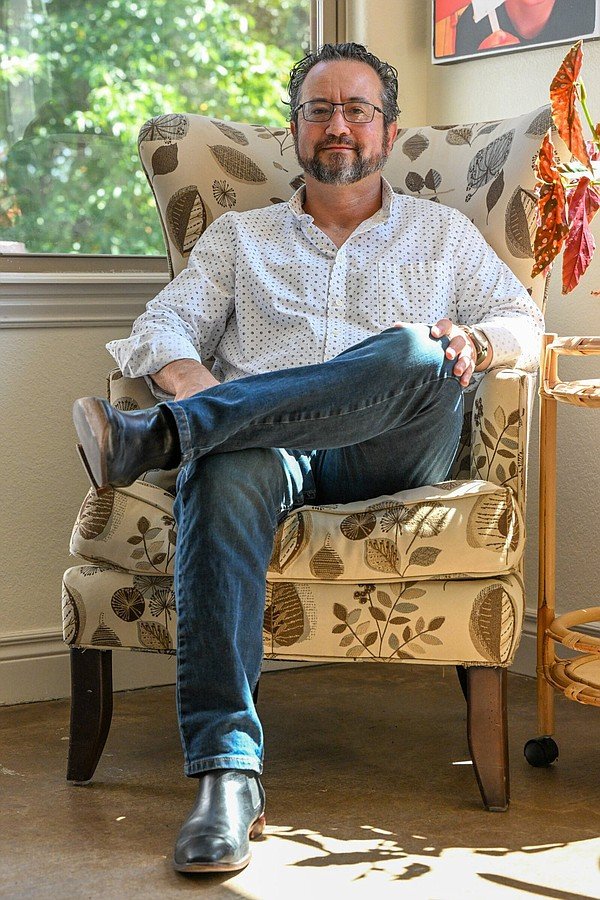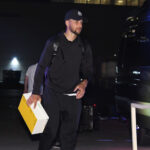As so many people in the world have grown curious about the prospect of electric vehicles, Marcelo Schupbach has been working on creating a new product line for them right in Fayetteville.
As head of application and system engineering for Wolfspeed Technology, a company focused on the electrification of vehicles, Schupbach is getting serious about pushing its technology into the market, working with big automotive customers worldwide, from Japan to Germany and the United States.
His role is to understand these big customers’ needs, customize products for them and find new solutions.
“Early on, the company was all [University of Arkansas] graduates doing this leading technology,” Schupbach says. Their collective work was for NASA and Formula One racing teams. They were doing “crazy research” and attracting what he calls the best electrical engineering graduates to work for them.
Arkansas Power Electronics’ work began in 2004 and would morph eventually into Wolfspeed. At the time, the university and the state of Arkansas were in the middle of a big push to motivate small technology businesses. The idea was to create a more diverse set of jobs in the Natural State and keep that talent from draining to either coast.
As a young business, that meant landing progressively bigger financial support and winning government contracts, small business innovation grants to do research for various government agencies, such as the Department of Defense and the Department of Energy. It soon grew from four or five people to a staff of 60, from working out of a small room to operating out of the Arkansas Research Park on the UA campus.
“We were able to stay here (in Northwest Arkansas) and fulfill our dream of creating cool things with the brightest minds staying here and producing value in Arkansas,” Schupbach says, noting that it became a globally recognized company and won high prize research awards, innovation awards and nationwide awards along the way. “I’m proud of doing that.”
MORE THAN 5,000 MILES AWAY
Schupbach was born in 1971 and raised in Gobernador Gregores, Argentina, a small farming community. The province of Santa Cruz is roughly the size of Arkansas, and its 150 miles of road are not paved, but it was a great place to have a childhood.
His town was fairly isolated and had less than 2,000 residents, which made it feel like a big family. Everyone there focused on ranching, farming and growing vegetables.
“We would run around town, go fishing and those kinds of things,” Schupbach says. He likens being in the Patagonia region to growing up in Montana. “You learn to survive early. There are not other people around to help.”
It pushed him to become resourceful. All throughout the 1970s in to the early ’80s, Argentina was under a military dictatorship, and in 1982 the country went to war with England. The Falkland Islands, “Islas Malvinas” in Argentina, were close to where Schupbach’s family lived and became the center of an undeclared war from April to June 1982, in which almost a thousand lives were lost.
As a teenager, Schupbach studied and gravitated toward math, geography and horticulture, along with the anatomy of small and large animals. His high school was a technical school where he and others would graduate with the certificate of farmer.
“In the afternoon we would drive tractors and deal with cows and sheep and horses and all that,” he says. “It was an interesting education, but quite poor in STEM. Technology was not a strength.”
When Schupbach’s sister went off to attend a university, she was the first person in the town to go to college. Their mother was an elementary principal and their father a high school professor, so despite the lack of college-educated residents surrounding them, there was never any question that the Schupbachs would earn their degrees.
Schupbach chose to study in Buenos Aires, nearly 2,000 miles away from home. He found he was not prepared and realized his education had not been great. At first his grades were poor, but by the end of his undergraduate experience, Schupbach was a top student.
He intended to finish his degree from the Universidad de La Plata and go home. But when Schupbach went back to campus to turn in his undergraduate dissertation, his professor had a unique proposition.
“She said, ‘I have a contact from the University of Arkansas looking for a graduate student; are you interested in going?’” Schupbach recalls. He had to borrow the use of a friend’s email to exchange a couple of messages with the professor, but within 48 hours, the decision was made. Schupbach would go to the U.S. for a master’s program. He just didn’t know English yet.
BY WAY OF MIAMI
To get from Buenos Aires to Fayetteville in 1998 was a bit of a production. There certainly wasn’t a plane ticket that could deliver him straight to Arkansas, so Schupbach flew first to Miami. He arrived at 6 a.m., and in the three hours that it took someone to get behind the counter, he figured it would be easy enough to communicate.
“I thought that in Miami people speak Spanish, but not this person,” he says, amused now that it’s a distant memory. From Miami he got to Memphis, then Schupbach took a crop plane from Memphis to Northwest Arkansas. He lived with a host family for a month before finding an apartment and attended a school for learning English. Schupbach would have to pass his fluency exam before he could be admitted to graduate school.
“English school for me was a mind blowing experience with people from all over the world,” he says. “Nobody speaks English, and relationships form quickly and deeply. You’re in a vulnerable state; you need each other.”
Schupbach got a roommate, who was from Honduras, and became good friends with a few other guys who were from Japan, Saudi Arabia and Russia. They were all figuring out the English language, learning about each others’ cultures and exploring Northwest Arkansas together. Spring International led groups to float the Buffalo River and take in a Razorbacks football game.
While Schupbach was shocked at the lack of public transportation in the region, he was equally surprised that the Razorback buses were free to hop on and also that you didn’t have to flag them down. But any culture shock he experienced paled in comparison to his experience of going from his farming town to Buenos Aires.
“Growing up in Patagonia was (to be) 20 years behind in the way of life … due to the remoteness … without access to news and TV and supermarkets,” Schupbach says.
Pretty soon in Fayetteville, Schupbach understood that not having a car felt very disconnecting, and he resolved to buy one two months into his stay. He went to withdraw money from an ATM to begin the process and found he could only remove $200 per day, so he repeated the process daily until he had a backpack of 20s that totaled $4,000. Schupbach hitched a ride with a friend and took the backpack to a guy on a farm who was selling a car for $5,000. Seeing the cash in person gave Schupbach a discount, and his friend left him having completed the duty of getting him there, thinking he would drive the car back.
“I (didn’t) know how to get back to Fayetteville,” Schupbach says. It pushed him into survival mode, and he used his broken English at a nearby gas station to find his way back.
Two months into life in Arkansas, Schupbach knew it was a good place for him. In a sense he never felt suited to Argentina, where the way of life was more chaotic. At any time a coup could happen, the economy could collapse, and people would have to start over.
“With so many tumultuous things happening, because of that they get to enjoy life,” Schupbach says. They party hard when times are good, but when things are bad, they’re looking to survive. It ebbed and flowed. “I enjoyed being here and felt the American dream alive. If you work hard, do what you’re supposed to do, you will progress in a way you won’t in other countries, no matter how hard you work.
“That had an appeal to me from the beginning.”
A MASTER FIRST
Dr. Juan Balda, professor of electric engineering at UA who would go on to be the head of the department for more than 13 years, had been on the other side of that email that brought Schupbach to Arkansas. He was seeking graduate students to help work on research that he’d secured grants for. He knew Schupbach’s English wasn’t very good, but he passed his fluency exam in only four months, then went on to the UA electric engineering master’s program.
“He was very enthusiastic,” Balda says. “I think he knew what he wanted to do, and he was highly motivated to succeed. He was also a good team player. Sometimes you have grad students who don’t fit, and they form a team and help each other. Marcelo was one of those.”
During a solar boat competition, in which various disciplines of engineering majors worked together to make the solar boat operate, they encountered a major problem. Its propulsion motor wasn’t working properly, so the boat couldn’t move. If the problem persisted, they wouldn’t be able to compete.
“Marcelo said, ‘Don’t panic,’” Balda recalls. “Being from southern Argentina where they’re used to getting things done, buying a part takes one or two weeks to get because it’s not available locally and sometimes you have to improvise. They went to the automotive store … bought a product … and the motors were working again. Not only did it compete, it won.”
Toward the very end of that master’s program, Schupbach met an undergraduate named Lindsay. The two bumped into each other at Futrall Hall. She had hung out with their group of mutual acquaintances of Spring International — a couple of guys from Argentina and a girl from Holland. When they ran into each other again, this time at the Union in December, Lindsay said, “Let’s hang out!”
HE TOOK IT SERIOUSLY
What he heard was “‘She would like to date me,’” Lindsay Schupbach says with a laugh. But Schupbach took it seriously, whatever it was. He asked her to give him five weeks. He’d be done with the semester, and they could connect somehow. “… We’ve been together ever since.”
Once Schupbach was back from the solar competition and exams were over, a group of friends threw a party in his apartment. He’d graduated with his master’s in engineering. Lindsay came, and soon after they went out for coffee. The five weeks was the time he needed to get through his qualifying exams for the Ph.D. program.
“The day I finished the last exam, I called her,” Schupbach says.
He cooked for Lindsay, who at first said she was vegetarian, but that quickly went out the window with all the good foods he prepared. They went for coffee a lot, and if they got hung up on deciding between two pastries, Schupbach just got both.
When Schupbach would say, “Let’s go to dinner,” that meant “Come over, I’ll cook,” Lindsay says. But first they’d make a run to the grocery store together. Walking in, Schupbach would ask, “What do you want to eat?”
The first night they decided to watch a movie together, but they had to first make a trip to Sam’s Club so Schupbach could get a VCR. It was love.
“He was OK with being slow; it was just so different (from what I’m used to),” Lindsay says. “We’ll just take this time to buy all this food and then cook and then do (whatever). That Latino time frame of savoring is what I was so drawn to because it was not my experience.”
HARD-EARNED SUCCESS
Schupbach decided to stay in Arkansas to pursue his Ph.D. and continued to investigate electric vehicles. He did some work regarding energy storage to associate with the propulsion system of an electric car, Balda says.
By the time he finished the doctoral program, Schupbach knew he wanted to stick around. Lindsay’s family lived in Central Arkansas, so remaining close in the northwest corner of the state was appealing. But there was no real work for Schupbach here, in his field anyway, until a friend of his began a small business.
“He was doing research on semiconductor materials with many applications, including electric vehicles, and he asked me to join the company,” Schupbach says. That was Arkansas Power Electronics, which catapulted to success.
By 2012 Schupbach saw the need for electric vehicles becoming more serious, and he followed an opportunity with a company in North Carolina, where he became discrete device scientist for the company. He went to work for them, thinking the technology was being incubated and ready to go onto the world stage.
“The company allowed us to do that,” he says. It was a good career move since it shifted him from working on renewable energy back to electric vehicles.
HE NEEDED A BREAK
The company wound up acquiring the same small business in Arkansas that Schupbach had worked for, and after a few years, he needed a break. In 2017 he, Lindsay and their two children spent a year in Argentina seeing as much of it as they could in that time. When they returned to the U.S., it made sense to land in Fayetteville. Grandparents were nearby, and Schupbach could go back to work for the same company, now Wolfspeed, which was under new leadership.
Schupbach has exhibited exceptional leadership at Wolfspeed himself through the silicon car device, Balda says, since the main market is for automotive products.
“He’s providing a vision for the growth of the product that Wolfspeed has in the automotive (sector),” he says. “He has a vision for what Wolfspeed should do.”
Now Wolfspeed products are part of electric Formula One cars, but Schupbach hopes the product will have more practical applications as the market grows and leaves room for the cost to reduce and become more manageable.
“Technology doesn’t mean much unless you can change the world for good in a certain area, if you can discover an opportunity to make it real, like placing it in cars you drive every day,” Schupbach says.
Schupbach has formed research teams not only in Fayetteville and Raleigh, N.C., but with teams at universities in Germany and England. He once had a research team in China, but that ended with the rise of the covid pandemic.
“He’s one of my best doctoral students,” Balda says. “I’m very proud of him because he demonstrates not only technological abilities but abilities to lead teams, which is not easy.”
SELF PORTRAIT
Marcelo Schupbach
A TYPICAL SATURDAY NIGHT FOR ME INCLUDES: Chilling at home with family.
MY GREATEST ACCOMPLISHMENT IS: As soon as I graduated from my Ph.D. program, I wanted to take some time off with a few months in Argentina, but I was worried that I did not have any money. I got advice to do it now, despite having no money. “With time and no money you can still travel and have a good time. Later you will have money but no time and you will not do it, so do it now.” So I did.
I KNOW I’VE DONE A GOOD JOB AT WOLFSPEED WHEN: I have met most of my professional objectives but the one I would love to see is see people that I have mentored and helped in their early years of their career be very successful.
A FEW PEOPLE I’D INVITE TO MY FANTASY DINNER PARTY: Snoop Dogg, Nikola Tesla, Gandhi, my dad and Evita Peron.
THE QUESTION PEOPLE ASK ME THE MOST: Should I buy an electric car? Answer: Yes, you should. This then goes on for at least half an hour when I answer all kinds of questions about cars, the environment and even politics and policies around this topic.
THE THING THAT MAKES ME LAUGH THE MOST: Disney movies. I love kids movies.
THE MOST DELICIOUS MEAL I’VE EVER HAD: On my back porch, tuna with my wife. Not the food but the experience is what it made this one special.
WHEN I HAVE AN HOUR OF FREE TIME, I SPEND IT: Learning something new.
THREE WORDS TO DESCRIBE ME: Resourceful, persistent, patient.
April Wallace is Associate Features Editor — Our Town, Profiles, Religion — and can be reached by email at [email protected] or on X @NWAApril.











